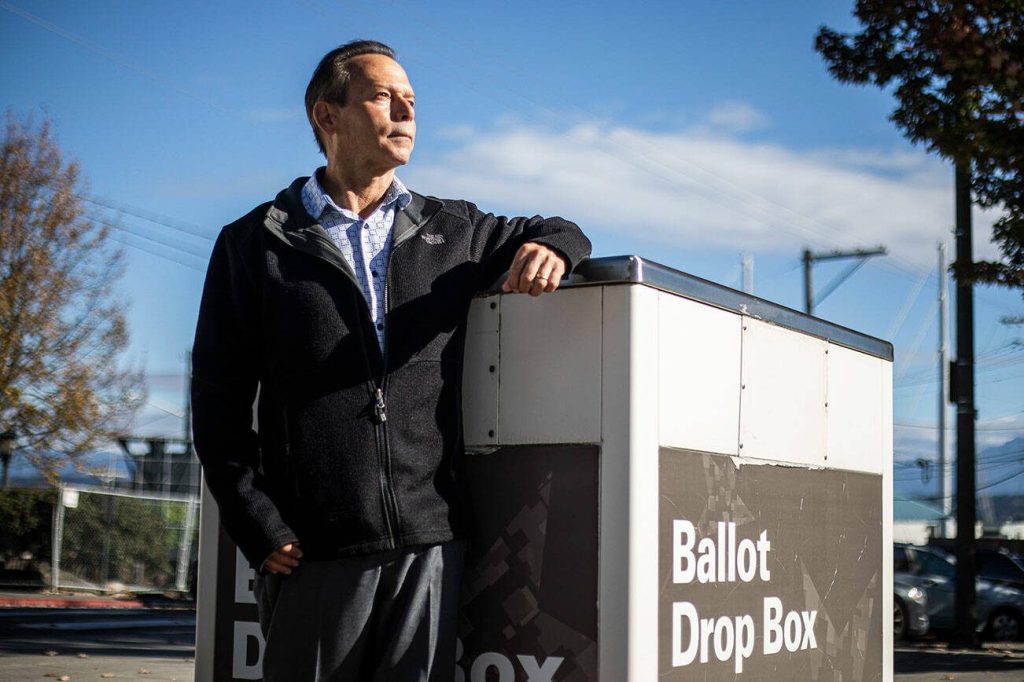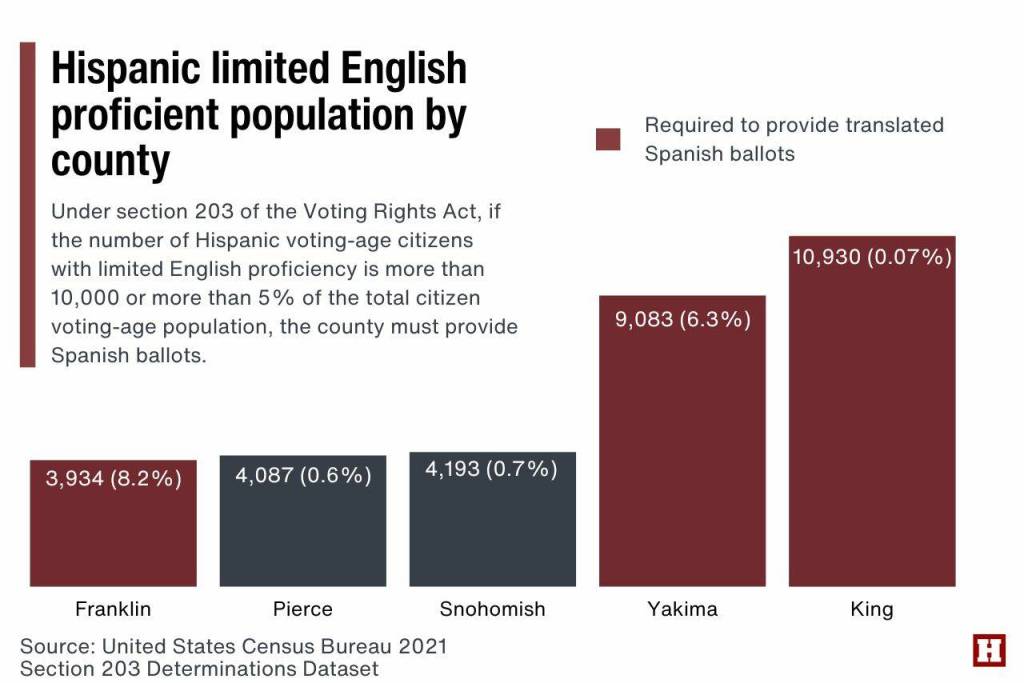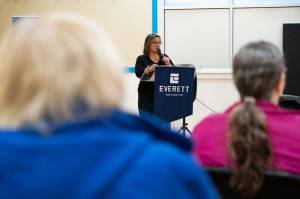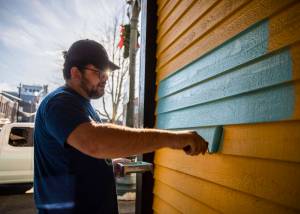Despite a growing need, county doesn’t provide ballots in Spanish
Published 1:30 am Friday, October 20, 2023



EVERETT — Nearly 4,200 Hispanic people in Snohomish County have English limited proficiency, according to state data.
But in the county, ballots and voters’ pamphlets are provided only in one language.
For Alvaro Guillen, it’s an equity issue.
Guillen, executive director of Connect Casino Road, interacts every day with non-English speakers who express frustration at the language barrier in all aspects of life, including voting.
Under federal law, Snohomish County isn’t required to distribute ballots in any alternate language. The federal Voting Rights Act says a county must provide election materials in another language upon meeting two requirements. There must be more than 10,000 voting-age speakers of that language who have limited English proficiency, or they must make up over 5% of the population. Within the group of limited English proficiency speakers, over 1.31% must also be considered illiterate in English.
In Snohomish County, Hispanic people with limited English proficiency make up 0.7% of the voting-age population, falling short of the federal baseline. Of those, 7.6% are considered illiterate.
County Auditor Garth Fell estimated a voters’ pamphlet in an alternate language costs between $10,000 to $15,000 per election, making cost a setback in the process. Overall, elections typically cost about $1 million, depending on the turnout.
Fell wants to expand election resources provided in Spanish and other languages. He said Snohomish County could see Spanish ballots in one or two years.
Guillen thinks more language assistance would increase civic participation among Hispanic voters. He used to live in King County, where Spanish ballots are required.
“Seeing information, materials and language assistance in Spanish made me feel welcomed, that I belonged,” he said.
Lost in translation
Guillen understands firsthand how difficult the language barrier can be.
When he arrived in the United States over 20 years ago from Paraguay, he felt intimidated walking into rooms where no one spoke Spanish or understood him.
Connect Casino Road serves a diverse community with many Latino immigrant families who have been historically marginalized, he said. The nonprofit is part of the Village on Casino Road, a group of organizations offering on-site services and resources for neighbors.
The Village links neighbors with an on-site food bank, English language tutoring, citizenship classes, job skills training and more.
People come to the Village to connect with other immigrants and bilingual people who have similar experiences, Guillen said.
The Spanish-speaking demographic is growing. Snohomish County has the third-highest number of Hispanic people with limited English proficiency in the state, according to data from the secretary of state.
“Here, families connect better, establish trust quicker when they are talking with families or employees here that have the same background,” he said. “It’s not only about nationality or language, but actually the lived experience.”
For Guillen, the ballots issue is bigger than just translating election materials. Many can’t vote because they aren’t naturalized citizens, he said.
In 2019, more than 50,000 Spanish-speaking immigrants were eligible to naturalize in Washington, according to the Center for Migration Studies.
The main obstacle is the price tag, Guillen said. It costs $725 to file a naturalization application.
According to data from the U.S. Census, residents in the neighborhood surrounding Casino Road have a lower median income than surrounding areas. The two census tracts representing the neighborhood surrounding Casino Road have a median income under $50,000.
Guillen said the technology gap in south Everett also prevents people from accessing voting materials in English or Spanish.
Most county information on voting is online or otherwise difficult to access, he said. More than 40% of the eastern portion of the neighborhood does not have broadband or satellite internet. In the same area, 16% of households don’t have a computer or tablet, according to Census data.
Guillen also wants to see more civic education for immigrants to help them understand what a healthy democracy looks like.
“We come from countries where we often don’t trust government, don’t trust elections,” he said.
Meeting the threshold
Fell, the county auditor, recognizes language access is an issue.
So does his opponent in the upcoming election, Cindy Gobel, a former coworker.
Gobel doesn’t think the county should wait until they are required to provide Spanish ballots.
“Seeing how we will grow over the next 10 to 20 years, we should be providing these opportunities now,” she said.
Gobel said the cost of providing Spanish pamphlets is something that should have been written into the county budget.
Fell wants to make sure the auditor’s office can continue to provide ballots in other languages from election to election without setbacks due to these costs.
He noted the auditor’s office has already made progress by providing interpretive services and translating documents on their website.
The office gauges the need for translating documents based on how often they are requested and how important the document is.
Some materials are available for translation on the county government website. The local voters’ pamphlet and ballots are not.
Guillen argues the county shouldn’t wait to reach the federal threshold to provide materials in another language.
Four counties in Washington — King, Yakima, Franklin and Adams — are required to provide election materials in an alternate language, based on their demographics.
King County provides ballots and voters’ pamphlets in six alternate languages. They are federally required to produce materials in Spanish, Chinese and Vietnamese. But the other three are not mandated: Korean, Somali and Russian.
“There is precedent from other cities and counties that are going the extra mile to bring the resources to the community that is needed,” Guillen said.
In Snohomish County, 3,500 Vietnamese speakers and nearly 2,500 Chinese speakers have limited English proficiency. Both fall short of the federal threshold.
Incremental progress
Fell, along with auditors across the state, has been working alongside the secretary of state and state lawmakers to lower the percentage required to provide ballots in alternate languages.
Earlier this year, state Rep. Clyde Shavers, D-Oak Harbor, introduced a bill in Olympia to lower the threshold for limited English proficiency voters to 1.5%, down from the 5% federal criteria.
He said the bill came about after talking to constituents in Skagit and Snohomish counties.
“People are disillusioned with the voting process,” Shavers said. “Democracy is stronger with all of us participating in it.”
After being introduced in the last week of the legislative session, the bill did not progress.
Shavers said he has been meeting with county and state officials to continue working on the bill. He plans to reintroduce it to the state House next year.
If passed in its original form, Snohomish County still would not be mandated to provide ballots in Spanish.
Shavers said it is likely for requirements in the bill to change once the Legislature is back in session.
“I think incremental progress is important,” he said. “In January, we may be looking at different percentages or different thresholds.”
Jenelle Baumbach: 360-352-8623; jenelle.baumbach@heraldnet.com; Twitter: @jenelleclar.







